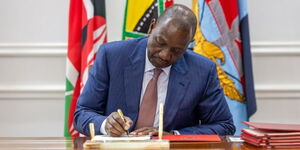The Central Bank of Kenya's (CBK) move to raise the base lending rate from 12.5 per cent to 13 per cent in February through to March and retain it at the same percentage seems to have set a precedent for other East African countries.
CBK Governor Kamau Thugge on Wednesday noted that the policy decision has had a positive effect including stemming inflation and addressing exchange rate pressures.
Tanzania seems to have taken a cue from Kenya's moves to solve its inflation menace that had dampened the country's economic outlook.
Tanzania on April 4, raised its base lending rate from 5.5 per cent to 6 per cent. The hike in the rate was announced by the Governor of Tanzania's Central Bank.
"The decision is based on the macroeconomic forecast made in March which requires an increase in the scope of monetary policy actions to contain the lingering inflationary pressures," stated the governor.
However, according to Professor XN Inaki, an economist who spoke to Kenyans.co.ke, Tanzania's decision to raise its lending rate to 6 per cent could have a slightly lower impact as compared to Kenya.
"Tanzania is a different economy- we can wait and see, but Tanzania's hike was much lower than Kenya’s and the impact is likely to be less," stated the economist.
According to him, besides raising the lending rate to curb inflation, countries can control the same through measures such as importing foodstuffs or growing more through non-rain-fed agriculture.
Meanwhile, Uganda has also recently adopted a similar strategy to address its own set of unique problems.
On March 6, Uganda raised its base lending rate to 10 per cent to help tame currency drop which had immensely affected the country’s economy.
"The depreciation of the shilling exchange rate has triggered the need for monetary policy to be tightened," the Central Bank of Uganda's deputy governor noted.
Uganda's bank governor attributed Shilling's drop to offshore investors pulling funds from Uganda to seek higher yields elsewhere, a trend that forced the country to raise the bank rates.












